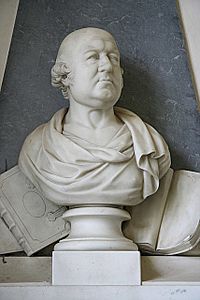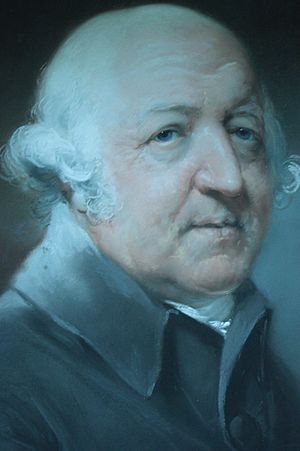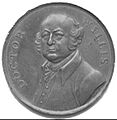Francis Willis (physician) facts for kids
Quick facts for kids
Francis Willis
|
|
|---|---|

The Nollekens bust of Willis in the church at Greatford
|
|
| Born | 17 August 1718 |
| Died | 5 December 1807 (aged 89) |
| Citizenship | British |
| Known for | Pioneering work in the field of mental health and his treatment of George III |
| Scientific career | |
| Fields | Psychiatry |
Francis Willis (born August 17, 1718 – died December 5, 1807) was a doctor and clergyman from Lincolnshire, England. He became very famous for helping King George III when the King was unwell. Willis was a pioneer in treating mental health issues, which were often misunderstood in his time.
Contents
Becoming a Doctor
Francis Willis was the third son of a clergyman. He first studied at Oxford University and became a priest, following his father's wishes. He worked as a rector (a type of church leader) for a few years.
However, Francis Willis was much more interested in medicine. He decided to study medicine at Oxford University and earned his medical degrees in 1759. After this, he started working as a doctor in Lincoln.
Helping People with Mental Health
Dr. Willis had great success helping people with mental health problems. In his time, these conditions were often called "wrongheads." He started treating these patients in his own home.
People noticed his success. One story tells of a tradesman from Lincoln who became unwell. Dr. Willis treated him so well that he was able to return to his job quickly.
Greatford Hall: A Special Place for Healing
In 1776, Dr. Willis moved to a large house called Greatford Hall. He turned it into a special private hospital for people with mental health conditions. It was a peaceful place in the countryside.
Dr. Willis believed that fresh air and exercise were important for recovery. His patients were encouraged to work outdoors. They helped with tasks like farming, gardening, and even fixing roofs.
A visitor in 1796 was surprised to see the patients. They were dressed neatly in black coats and white waistcoats. This was part of Dr. Willis's treatment. He believed that looking tidy and being active helped people feel better and recover.
Treating King George III
King George III became very unwell in 1788. He suffered from a mental illness that baffled his usual doctors. Some historians think it might have been caused by a rare blood disorder or even something in the King's hats!
The Queen was very worried. A friend recommended Dr. Willis because he had successfully treated her mother. So, Dr. Willis was called to help the King.
Willis's Treatment for the King
Dr. Willis treated King George III at a place called The White House in Kew. His methods were a mix of common practices of the time, like using restraints (like a straitjacket), but he also showed more kindness. This was unusual for the period.
On February 26, 1789, Dr. Willis announced that the King was completely better. This made Dr. Willis a huge celebrity in Britain. Many portraits were painted of him. He even had a special medal made to celebrate his achievement!
The King rewarded Dr. Willis with a large amount of money each year for 21 years. His son, Dr. John Willis, also received money for life. Because of the King's recovery, Dr. Willis became nationally famous. He even had to open a second hospital nearby to help all the new patients who wanted his care.
The King's Later Illnesses
Twelve years later, in 1801, King George III became unwell again. This time, two of Francis Willis's sons, John and Robert, treated him.
The King had a final relapse in 1810. This time, his illness was incurable. He remained unwell until he passed away in 1820.
Helping the Queen of Portugal
Dr. Willis's fame spread beyond Britain. In 1792, he was asked to help Queen Maria I of Portugal. She also suffered from episodes of mental illness.
Dr. Willis's role was mainly to give advice. He suggested treatments like talking therapy and good nutrition, rather than just medicines. Although his success wasn't as clear as with King George III, he earned a lot of money for his advice.
Dr. Willis's Family
Dr. Francis Willis married Mary Curtois. They had five sons who survived him, including Rear Admiral Richard Willis.
Dr. Willis's Legacy
The original Greatford Hall hospital closed in 1838. Much of it was later destroyed by fire in 1930, but it was rebuilt and is now a private home.
There is a monument to Dr. Willis in the church at Greatford. It is a bust (a sculpture of his head and shoulders) made by Joseph Nollekens. The monument praises his skill and kindness. It mentions how he helped King George III and earned the respect of the nation.
Today, a modern mental health unit is named after him. The Francis Willis Unit helps men aged 18 to 65 with mental illnesses. It focuses on helping them recover and live less restricted lives.
Images for kids
See also
 In Spanish: Francis Willis para niños
In Spanish: Francis Willis para niños
 | DeHart Hubbard |
 | Wilma Rudolph |
 | Jesse Owens |
 | Jackie Joyner-Kersee |
 | Major Taylor |




